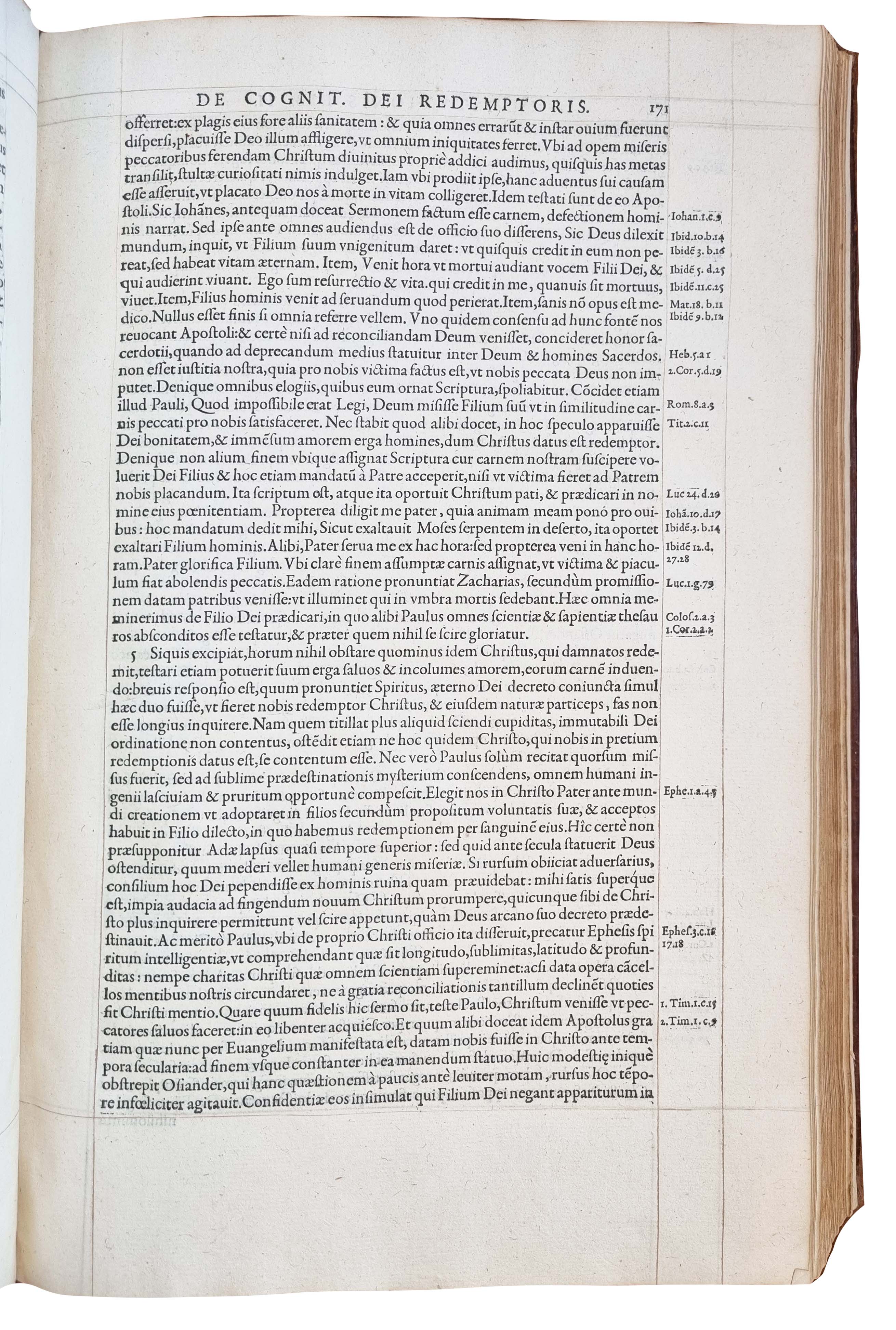CALVIN, Jean.
CONTEMPORARY GENEVA ARMORIAL BINDING
Institutio Christianae religionis.
Geneva, F. Perrinus, 1568.£4,850.00
Folio. pp. [16], 596, [76]. Roman letter, little Italic, all pages ruled in red, final index in double or triple column. Large woodcut printer’s device to title, decorated initials and ornaments. Lower outer blank corner of title a little soiled, minor ink splash to first 4 ll. and upper outer blank corner of D8v and E2r, short clean tear along ruling to upper blank margin of a5 and h7, faint water stain along upper edge of handful of ll. An excellent, clean copy in handsome contemporary Swiss polished calf, double gilt ruled, gilt arabesque cornerpieces, large gilt centrepiece with arms of Geneva surmounted by IHS and motto ‘Post tenebra lux’, within gilt border with grotesques, interlacing ribbons and ‘NVLLA DIES ABEAT QVIN LINEA DVCTA SVPERSIT’, raised bands, gilt fleuron to compartments, head and foot of spine cross-hatched in blind, a.e.g., 2 corners and foot of spine expertly repaired, lower endband renewed, couple of faint water stains at foot, eps renewed (but not modern). Modern bookplate JJS to front pastedown, ms ‘Missus Geneua et dono d[at]us noni Oct 1582o à D.C.A.M.E.F.S.’ and C20 pencilled note to title, couple of contemporary ms marginalia, one with ‘Guillaume’.
Handsomely bound in contemporary Swiss polished calf, with cornerpieces much resembling in shape, size and style those in the Swiss BL, Davis592. It bears a gilt centrepiece with the arms of Geneva and a motto which can be translated ‘Not a day without a line’. This was first hinted at by Pliny to describe the Greek painter Apelles’s work; it was formulated as ‘Nulla die sine linea’ in the medieval period, and, as here, by the Neo-Latin poet Fausto Andrelini in 1509, with the broader meaning ‘No day goes by without writing a line’ or simply ‘without doing some work’ (Nikitinski, p.430). The motto was especially popular among C16 and C17 lawyers, as far as north as the Inns of Court, and appears in ‘emblemata iuris’, i.e., symbolic representations appropriated to represent the law (e.g., in Rollenhagen’s ‘Emblematum’) (Goodrich, p.254). The early owner, unidentified, may have thus been a Genevan lawyer.
Very good, handsomely bound copy of this immensely influential work by Jean Calvin (1509-1564), a French theologian who contributed to the introduction of the Reformation to France and Switzerland. First published in Latin in 1536, the ‘Institutio’ presented a systematic analysis of Protestant doctrines with the purpose of dissociating the new religious ideas from attacks against established political authority launched by the Anabaptists and condemned by Francis I, to whom the work is dedicated. The 4 parts discuss fundamental theological questions like the knowledge and understanding of God’s divine nature, the doctrines of justification by faith alone and of predestination—which differentiated Calvin’s thought from Luther’s. His influential theories inspired, among others, the religious and political ideas of the French Huguenots and the Scottish, English, and Irish Presbyterians. This edition has two remarkably detailed subject indexes, one by ‘loca’, the other by specific keywords.
A dozen US library holdings. GLN 796; USTC 450136; Peter & Gilmont, III, n.68/2; Graesse, VII, 143. P. Nikitinski, ‘Zum Ursprung des Spruches Nulla dies sine linea’, Rheinisches Museum, 142 (1999), pp.430-1; P. Goodrich, Legal Emblems and the Art of Law (2014).In stock





